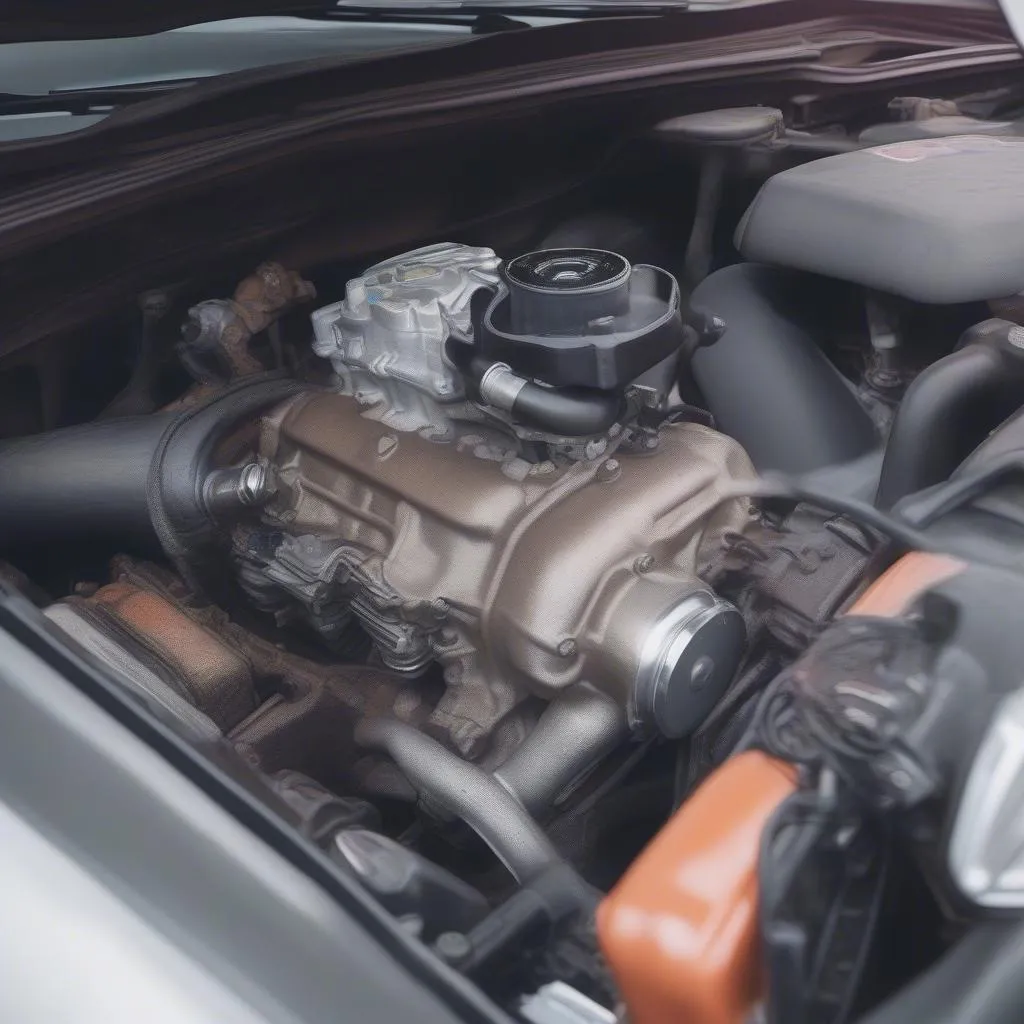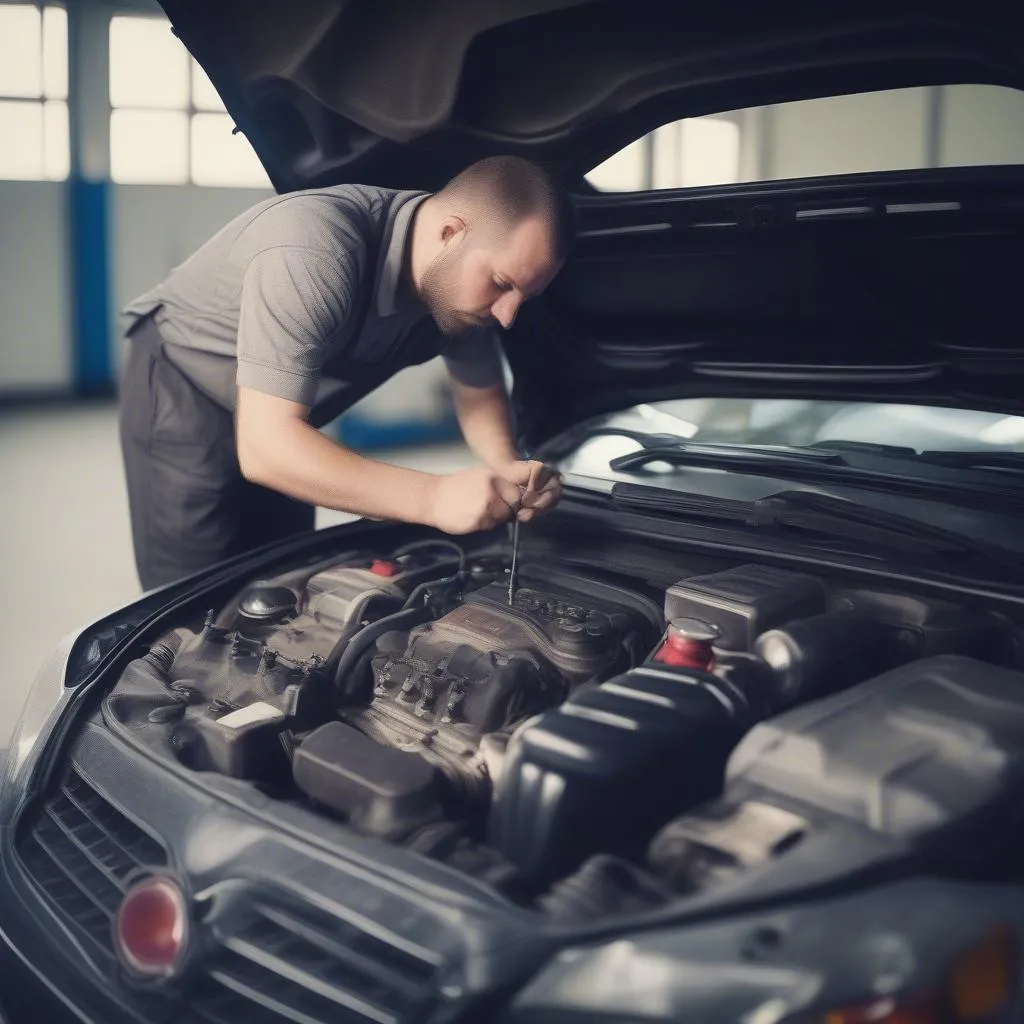“Clank, clank, clank…” That’s not the engine roaring to life; that’s the sound of your car screaming for help! We’ve all been there – turning the key, hearing that awful metallic sound, and feeling a wave of dread wash over us. But fear not, fellow drivers! In this article, we’ll delve into the mysterious world of car noises and help you decode that ominous metal clanking sound when starting your car.
What Does a Metal Clanking Sound When Starting Your Car Mean?
For many car owners, a strange noise is their first sign of trouble. But what is that metal clanking trying to tell you? Let’s look at it from a few different perspectives:
The Mechanic’s Perspective: A Symphony of Malfunctioning Parts
From a mechanic’s viewpoint, your car is a complex orchestra of moving parts. A metal clanking sound is like a jarring note in the symphony, indicating something is out of tune. It could be a loose heat shield rattling against the exhaust manifold, a worn-out starter motor struggling to turn the engine, or a problem with the timing belt system.
The Technical Perspective: A Closer Look Under the Hood
Technically speaking, a metal clanking sound often signifies metal-on-metal contact. This could be due to worn bearings, loose components, or even serious engine problems. For instance, low oil pressure can lead to inadequate lubrication, causing metal parts to grind against each other, resulting in that dreaded clanking sound.
The Economic Perspective: Early Detection Saves Money
Financially speaking, ignoring a metal clanking sound is like ignoring a small leak in your roof. What might seem like a minor annoyance now could escalate into a major (and expensive) repair later on. Addressing the problem early can save you a lot of headaches and money in the long run.
Decoding the Clank: Common Causes and Solutions
Now that we understand the potential seriousness of a metal clanking sound, let’s explore some of the most frequent culprits:
1. Starter Motor Issues
The Culprit: Your starter motor is responsible for cranking the engine to life. When it starts to wear out, its gears can become misaligned, causing that telltale clanking sound as it struggles to engage.
The Fix: If the clanking is accompanied by a slow engine crank, your starter motor is likely the culprit. A qualified mechanic can diagnose and replace it if necessary.
2. Loose Heat Shield
The Culprit: Heat shields protect sensitive components from extreme engine heat. Over time, the bolts securing them can loosen, causing the shield to vibrate and clang against the exhaust system, particularly during startup.
The Fix: A simple tightening of the bolts usually solves this issue. However, if the shield is damaged, it might need replacement.
3. Timing Belt or Chain Problems
The Culprit: The timing belt or chain ensures your engine’s valves open and close in sync with the pistons. A worn or loose belt/chain can cause a rattling or clanking sound, especially noticeable during startup.
The Fix: This is a serious issue requiring immediate attention. A broken timing belt/chain can cause catastrophic engine damage. Consult a mechanic for inspection and repair or replacement.
4. Low Oil Levels or Pressure
The Culprit: Engine oil lubricates moving parts, reducing friction and preventing wear. Low oil levels or pressure can cause metal components to grind, leading to a clanking noise on startup.
The Fix: Regularly check your oil levels and address any leaks promptly. If low oil is the issue, topping it off might solve the problem. However, if the noise persists, consult a mechanic to investigate potential oil pressure issues.
Metal Clanking Sound When Starting Car: Real-Life Scenarios
Let’s illustrate these issues with a few relatable examples:
- Scenario 1: Imagine cruising down Highway 1 in California, enjoying the Pacific views, when suddenly your Ford Mustang starts emitting a metal clanking sound upon starting. You take it to a mechanic in San Francisco who diagnoses a loose heat shield. A quick tightening later, and you’re back on the road.
- Scenario 2: You’re in Munich, Germany, about to embark on a road trip through the Bavarian Alps in your BMW X5. But before you can say “Autobahn,” a metallic clanking noise greets you upon starting the car. A local mechanic discovers a worn-out starter motor.
- Scenario 3: Picture this: you’re driving through the bustling streets of New York City in your Chevrolet Camaro when you notice a concerning clanking sound at startup. A mechanic in Manhattan identifies the problem as a failing timing chain, requiring immediate replacement.
 Car Engine
Car Engine
Beyond the Clank: Additional Tips and FAQs
While we’ve covered the most common causes, other less frequent culprits could be causing that metal clanking sound:
- Worn-out water pump bearings: A failing water pump can also produce a clanking or whining noise, especially noticeable on startup.
- Loose or damaged flywheel: A loose or damaged flywheel can create a rattling or clanking sound during startup.
- Exhaust system issues: A loose exhaust manifold or other exhaust components can vibrate and produce a metallic noise.
FAQs
Q: Can a metal clanking sound damage my car?
A: Yes, ignoring a persistent metal clanking sound can lead to further damage and costly repairs. It’s crucial to address the issue promptly.
Q: Should I be concerned if the sound goes away after the engine warms up?
A: Even if the sound disappears, it’s still wise to have a mechanic investigate it. Some problems, like a loose heat shield, might only be noticeable during startup.
Q: How much does it cost to fix a metal clanking sound?
A: The repair cost depends on the underlying cause. A loose heat shield fix could be inexpensive, while a timing belt replacement could be significantly more expensive.
Q: Can I prevent a metal clanking sound when starting my car?
A: Regular car maintenance, including oil changes, inspections, and addressing unusual noises promptly, can help prevent many issues that cause clanking sounds.
 Car Mechanic
Car Mechanic
Don’t Let That Clank Ruin Your Ride!
A metal clanking sound when starting your car is never a good sign, but it doesn’t have to be the end of the road. Early detection and prompt action are key to preventing further damage and costly repairs. If you’re experiencing this issue, don’t hesitate to seek professional help.
Need assistance diagnosing and resolving car problems? Contact us via Whatsapp at +84767531508. Our team of expert automotive technicians is available 24/7 to provide guidance and support.
We hope this article has provided valuable insights into the world of car noises. Remember, listening to your car and addressing unusual sounds promptly can save you time, money, and potential headaches down the road!
Looking for more car care tips and advice? Check out these related articles:
- Common Car Noises and What They Mean
- The Importance of Regular Car Maintenance
- Troubleshooting Car Starting Problems
Let us know in the comments below if you have any questions or share your experiences with car noises!